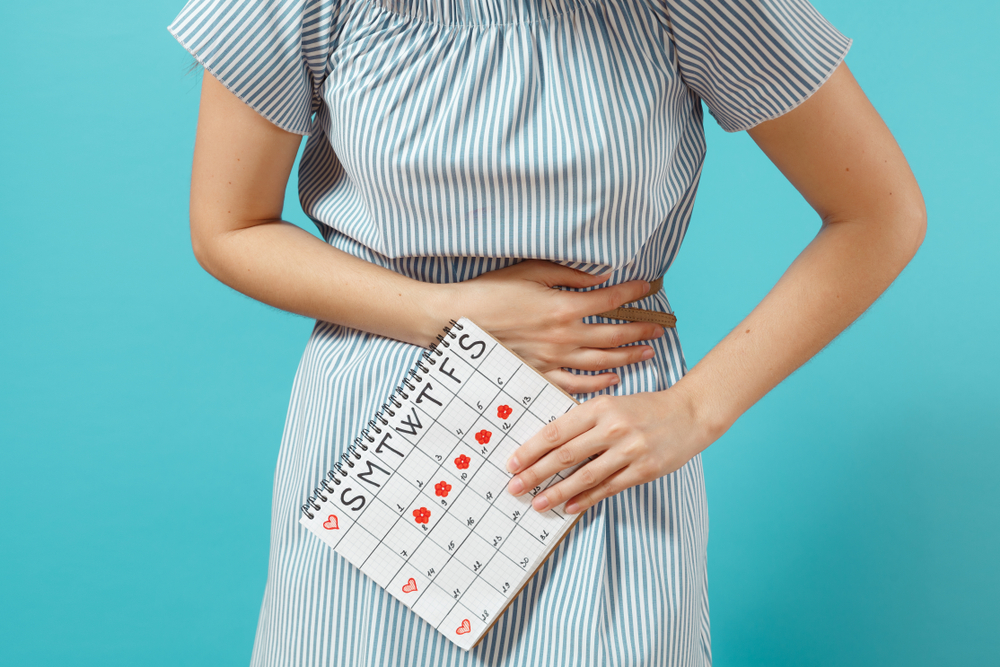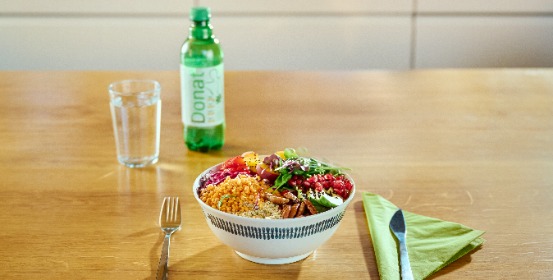Bloating is a common period symptom many women have to deal with. It might occur before or during menstruation, causing your stomach to feel tight and swollen. This can also have a negative impact on your self-confidence as you might feel you have gained weight due to your period, something you definitely do not want to deal with in the midst of PMS and other period-related problems.
Even though it can be extremely uncomfortable, bloating before your period is perfectly normal and should go away after a couple of days of menstruating. Luckily, there are certain remedies that could help you reduce bloating even quicker. This article offers some general tips while also exploring what might be causing bloating during a period and how long period bloating generally lasts.
Why Are Women Bloated During Periods?
The main reason for bloating during a period is a fluctuation in hormones. When you are approaching the start of your period, your progesterone levels tend to fall, causing the uterus to shed its thickened lining, which results in menstrual bleeding. Such activities in your body lead to increased sensitivity, bloating, and general discomfort.

Moreover, changes in progesterone and estrogen levels cause your body to retain more water and salt, which again leads to bloating. So hormones are not the only ones to blame for your mood swings during PMS, they are also the culprits when it comes to answering the question why you bloat on your period…
However, bloating can also be connected to your genes, your diet, as well as your alcohol and caffeine consumption. Check the tips in this article to see which changes you should implement in your daily routine to keep bloating under control.
How Long Does Period Bloating Last?
Period bloating generally appears around one to two weeks before your period or also only a couple of days before.
Your body supposedly retains the most water on the first day of your period, so the situation should calm down during your period or at least a few days after.
However, if you experience extreme bloating before your period or your period bloating prevents you from engaging in your daily activities, you should talk to your doctor to determine possible underlying causes.

Ways to Manage and Reduce Period Bloating
If you are wondering how to get rid of period bloating, be aware that there is no miracle solution. However, there are many simple lifestyle changes you could implement into your daily routine to reduce period bloating.
1 Change your diet
You already know bloating is related to water retention. The sodium in salt can increase the amount of water retained in your body, which is why avoiding salty foods can help your bloated stomach during this period.
Instead of giving in to your cravings for crisps and other unhealthy snacks during your period, you should rather opt for fruits and vegetables, as well as other healthy foods like whole grains, lean protein, nuts, and seeds.
Even though such a swap might be a bit difficult, your bloated belly will be extremely grateful.
2 Drink a lot of water
It is true your body already retains a lot of water during your period, but this does not mean you should dehydrate it to decrease bloating. Quite the contrary—you should drink plenty of water before and during your period to make sure you improve kidney function, urinate frequently, and stay well-hydrated.
And if you are bored of plain water, you might want to try mineral water or – and this is an even better idea – Donat, a mineral water with above-average mineral content that is clinically proven to speed up your digestive system, thus relieving bloating symptoms and significantly contributing to your overall well-being.

3 Avoid alcohol and caffeine
Both alcohol and caffeine cause bloating as they lead to dehydration and slow down your digestion. Additionally, alcohol is high in calories and also wipes out beneficial bacteria in your digestive system that usually deal with bloating. This is why it is a good idea to cut down on both, especially during your period.
4 Exercise
Even though you might be feeling less than ready to get up and move during your period, it is the best way to deal with bloating. Exercising can help the lymph, i.e. extra fluid in your body, move around and ease your discomfort. If you don’t forget to drink plenty of water after your workout, your digestive tract will do wonders in its fight against period bloating.
5 Try diuretics
Diuretics increase the production of urine, which helps your body get rid of water more easily. This is why taking diuretics can help you deal with water retention. You do not have to buy any special diuretics, as there are plenty of foods with natural diuretic properties, such as asparagus, beets, cabbage, celery, cucumbers, watermelon, and others.
Period bloating is definitely not something you want to deal with on top of your PMS and other period-related problems. However, it is unfortunately a common symptom that can cause a lot of discomfort. If you make sure you drink plenty of water, get your body off that couch, avoid salt, caffeine and alcohol, as well as adding some diuretics to your diet, you will soon be able to say goodbye to your period bloating issues!
Choose chapter:






